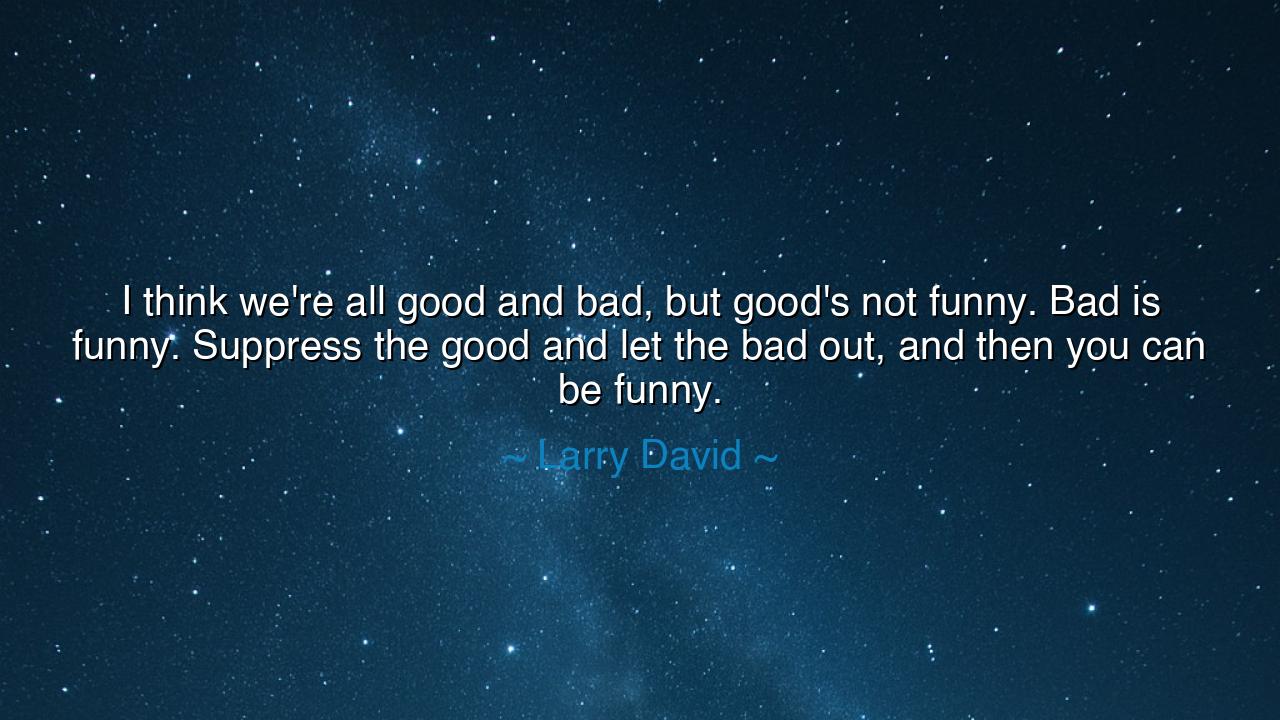
I think we're all good and bad, but good's not funny. Bad is
I think we're all good and bad, but good's not funny. Bad is funny. Suppress the good and let the bad out, and then you can be funny.






The philosopher of modern discomfort, Larry David, once said: “I think we’re all good and bad, but good’s not funny. Bad is funny. Suppress the good and let the bad out, and then you can be funny.” To the casual ear, this may sound like the jest of a comedian delighting in cynicism. Yet beneath the laughter lies a truth as sharp as a blade — a truth about human nature, about humor, and about the eternal dance between our light and our shadow. For what David reveals is not a call to wickedness, but a revelation of how honesty about our flaws brings both laughter and liberation.
To say that “good’s not funny” is to acknowledge that perfection does not move the heart. The virtuous man, steady and untroubled, may inspire reverence, but he rarely provokes laughter. Laughter is born from conflict — from the stumble, the failure, the moment when we see our own foolishness reflected back to us. The ancients knew this well. The playwright Aristophanes, in the city of Athens, filled his comedies not with heroes, but with fools — men who lied, lusted, and boasted, only to be undone by their own folly. And the people laughed, not out of cruelty, but out of recognition. For in watching the failings of others, they saw themselves — and found relief.
David’s insight, then, is that comedy lives where perfection dies. To be funny is to tell the truth of our contradictions. The “bad” he speaks of is not evil, but honesty — the small, selfish impulses that dwell in every heart. When he says “suppress the good and let the bad out,” he is urging the comedian, and indeed all of us, to cast aside the mask of virtue long enough to be real. The good is our armor, polished and polite. The bad is our humanity, raw and unguarded. And in exposing it, we free ourselves and others from the burden of pretending to be better than we are. That, perhaps, is the deepest laughter — the laughter of truth.
Consider the philosopher Diogenes, the beggar-sage of ancient Greece, who mocked the hypocrisies of society by living in a barrel and calling himself the freest of men. When Alexander the Great came to see him and asked if there was anything he could do for him, Diogenes replied, “Yes — stand out of my sunlight.” The crowd roared. His words were impudent, even “bad” — disrespectful to power — yet they carried a deeper truth. Diogenes’ shamelessness became his strength. Like Larry David’s humor, his boldness revealed what others feared to say: that we are ridiculous creatures, puffed up by ego, desperate for control, yet forever undone by our own absurdity.
Larry David’s characters, too — from Seinfeld to Curb Your Enthusiasm — embody this comic honesty. They are selfish, impatient, awkward, and vain. They say what others only dare to think. They violate the silent laws of politeness that bind society. And we laugh — not because they are villains, but because they are us, stripped bare of pretense. In this way, David teaches that comedy is not cruelty, but catharsis — a way to release the tension between who we are and who we wish to be. The “bad” is funny because it is true; the “good” is dull because it is false or idealized. Laughter, then, becomes an act of truth-telling — a rebellion against the polite lie.
Yet his wisdom extends beyond the stage. To suppress the good in the way he means is not to abandon kindness or morality, but to stop performing them for approval. It is to be brave enough to reveal the messy, contradictory self beneath the surface. The ancients called this authenticity — to live without fear of imperfection. For it is in imperfection that connection blooms. When we laugh at our own faults, we loosen the chains of shame and pride; we become lighter, freer, more human. David’s teaching, in its humor, carries a profound moral paradox: to embrace our “badness” is the first step toward being honestly good.
So the lesson is this: do not fear your flaws. Do not hide behind the mask of constant virtue. The world is hungry for truth, not performance. Laugh at your impatience, your awkwardness, your contradictions — for these are the threads that weave humanity together. The more you hide them, the lonelier you become; the more you reveal them, the funnier — and freer — you grow. Laughter, born from honesty, cleanses the soul of hypocrisy.
Therefore, my child, when you feel the urge to pretend perfection, remember the words of Larry David. Suppress the good — that is, the performance of goodness — and let the bad speak for itself. Let your imperfections breathe. In that brave, awkward honesty, you will find not shame but liberation. For the gods themselves, it is said, laugh not at virtue, but at the foolishness of mortals who believe they have none. To laugh, then, is to join in that divine wisdom — to see yourself clearly, and still find joy.






AAdministratorAdministrator
Welcome, honored guests. Please leave a comment, we will respond soon